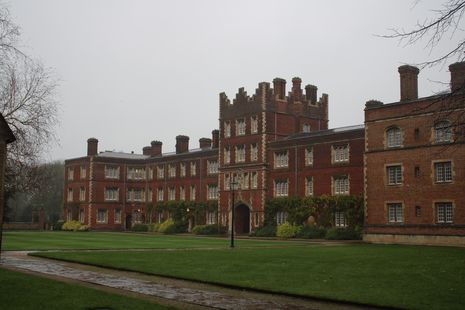University and Jesus agree £10 million partnership with Brazilian company accused of environmental crimes
Suzano has been accused of land grabbing by indigenous communities

Jesus College and the University of Cambridge have announced a partnership with Brazilian biomaterials company Suzano, despite the firm being accused of mistreatment of indigenous communities and environmental greenwashing.
According to a statement from Jesus College, the Suzano Scholars Fund will be used to “support education and research into areas including the conservation of biodiversity, enhancing business sustainability, and the restoration of natural habitats in Brazil and beyond”.
The fund is made up of a £10 million donation that will be split with £7.85 million to Jesus College and £2.15 million to the University of Cambridge.
The funding will be offered to postgraduate Brazilian nationals studying Cambridge degrees related to “the environment, ecology and conservation”, alongside academics at the University’s Conservation Research Institute.
Suzano is the largest paper manufacturer in Latin America and is reportedly facing up to 262 civil and environmental legal proceedings. Indigenous communities in Brazil have accused the company of land grabbing, water contamination, and pesticide-related harm, among other social and environmental grievances.
According to the Family Farm Workers Union (SINTRAF) in Anapurus, North-Eastern Brazil, around 70% of the land acquired by Suzano originates from land grabbing. The company owns over a million hectares of eucalyptus plantations across Brazil and reportedly plans to double that in the next decade.
The company rejects these claims, and claims that its practices of planting new trees provides net benefits in terms of biodiversity and climate change.
Members of one “quilombo” – a word used to describe communities which were originally formed by African people who escaped slavery – in the Southern Brazilian region of Volta Miúda have said that Suzano’s plantations have led to lower groundwater levels in their territory, with agrochemicals polluting their waterways.
Suzano also plans to build a new road in the region, which community members argue will destroy their traditional paths and gathering sites.
One community member told DW in 2023: “Suzano commits environmental racism. It disregards and disrespects the history of our people, our black ancestry and the suffering we carry and experience. They are ignoring us. Our right to be consulted has been violated.”
An article published by Mongabay earlier this year also detailed allegations that quilombo community members in the region of Sapê do Norte had suffered medical problems because of “toxic crop dusting” by Suzano.
Members of this community reported physical sensations, such as itching, stomach issues, and headaches as a result of the pesticides. One resident’s retina was reportedly detached after the “poison” landed in her eye.
A report published by the Alert Against the Green Desert network also showed that Suzano emits approximately 4 million tonnes of CO2 on an annual basis, which is more than the annual carbon emissions of 32 countries.
Aracruz Celulose S.A., a manufacturer acquired by Suzano in 2009, has also been accused of “dictatorship-era human rights abuses” against indigenous groups. Before its arrival in Sapê do Norte, approximately 12,000 quilombola families lived there. Now, this is less than 2,000.
The environmental group Organisation of Radical Cambridge Activists (ORCA), who have accused Jesus and the University of greenwashing, told Varsity that they are “horrified to hear that the university is entering into yet another toxic partnership”.
“Rhetoric about decolonisation and environmental responsibility is completely hollow while the university continues to work with companies so involved in the exploitation of land, people and water,” they said.
“The Landless Workers Movement (MST) and Indigenous People have resisted Suzano in Brazil for over a decade, and we stand with them against this harmful, greenwashing company,” the group continued.
Jesus has faced other allegations of greenwashing, following a talk held on 19 November, called “In the Business of Conservation.” The talk panel consisted of a former member of the World Wide Fund for Nature (WWF), a current Executive Director at the WWF, and a biodiversity consultant.
In an Instagram post after the event, ORCA accused Jesus College of being “complicit in WWF’s violent colonial conservation project.”
They alleged that the WWF practices “fortress conservation, a violent colonial form of conservation that involves removing traditional stewards of the land” while allowing “trophy hunters onto lands they are ‘conserving’ in order to make a profit”.
A spokesperson for Jesus College said: “Suzano’s £10 million donation to Jesus College and the University of Cambridge underwent thorough due diligence by both organisations.”
“The gift will be used to further the education of Brazilian nationals studying for a postgraduate degree connected to the environment, sustainability, ecology and conservation, and to support education and research into areas including the conservation of biodiversity, enhancing business sustainability, and the restoration of natural habitats in Brazil and beyond,” they said.
 News / Cambridge academics sign open letter criticising research funding changes22 February 2026
News / Cambridge academics sign open letter criticising research funding changes22 February 2026 News / Student and union protesters hold ‘Trans Liberation Solidarity Rally’ 24 February 2026
News / Student and union protesters hold ‘Trans Liberation Solidarity Rally’ 24 February 2026 News / Union speakers condemn ‘hateful’ Katie Hopkins speech14 February 2026
News / Union speakers condemn ‘hateful’ Katie Hopkins speech14 February 2026 Features / Beyond the porters’ lodge: is life better outside college?24 February 2026
Features / Beyond the porters’ lodge: is life better outside college?24 February 2026 Fashion / The evolution of the academic gown24 February 2026
Fashion / The evolution of the academic gown24 February 2026








